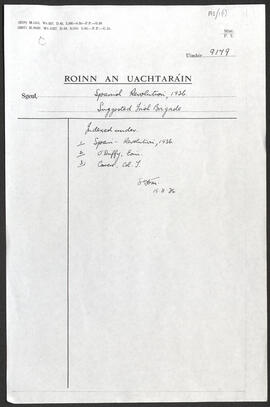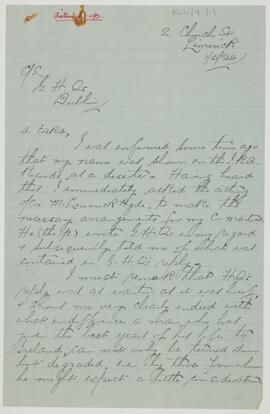Correspondence between The National Bank Ltd., 15 Whitehall, London; John Dundon & Son Solicitors, 101 O’Connell Street, Limerick and Anne O’Mara, relating to Kate O’Brien’s overdraft and attempts to find a solution to the bank having a legal charge of her property.
O'Mara family of Strand House, LimerickMostly photocopies of official letters from Department of President, Pádraig Quinn of Kilkenny Blueshirt Division, and brothers John C. Dunphy, J. J. Dunphy and P. L. Dunphy, also involved in recruitment in the Kilkenny-Carlow area, referring to the establishment of an Irish Brigade, the delay of departure of Irish Brigade for Spain, and articles necessary for each volunteer. Includes copy of a letter from Pádraig Quinn, Kilkenny Blueshirt Division (League of Youth), Gowran House, Gowran, county Kilkenny, to Joe Duffy, regarding the question of an Irish Brigade going to Spain, noting his wish to be a member of such an organisation when the time comes, and stating ‘A number of Blueshirts here and there throughout the counties of Carlow and Kilkenny have volunteered their services for the “Irish Brigade” to Spain, the motive of such service being for the “GLORY OF GOD and the HONOUR OF IRELAND”’ (22 September 1936). Also contains copy of a letter from Padraig Quinn, Gowran House, to Joe Doyle, which reassures him that they should not be upset by men withdrawing their names from membership of Brigade (23 October 1936). In addition, a copy of a letter to Doyle from John C. Dunphy, 52 Tullow Street, Carlow, who states ‘I am instructed by Capt. Quinn, who was himself instructed by General O’Duffy, to request that you… procure a passport immediately, for all European countries. Do not mention Spain. If you choose, say you are going to a job somewhere’ (18 November 1936). Also contains list of articles necessary for each volunteer which includes one small valise, one heavy overcoat, one pair of breeches, one pair of heavy nailed boots (or shoes), three pairs of heavy socks (hand knit if possible), one spare set of heavy underwear, one leather strap strong (over 42” long), one pouch (for ammunition) and one shaving outfit.
Stradling, Robert Arthur, scholarCorrespondence with trade union representatives relating to a demand for an advance in butchers’ wages. Also related handwritten notes, accounts and calculations.
O'Mara family of Strand House, LimerickCorrespondence between William Montgomery & Son, 97 Grafton Street, Dublin; Maurice E. Veale Solicitor, 6 Lower Baggot Street, Dublin C18; Ocean Accident & Guarantee Corporation Limited, Trust Department, 36 to 44 Moorgate, London EC2; J. G. Onions, Borris, Marlborough, county Laois and D. & T. Fitzgerald Solicitors, 30 Anglesea Street, Dublin C4 concerning a property named Annebrook in Portlaoise on the Coote Estate, the leasehold interest of which, originally belonging to Margaret Meehan, has recently been acquired by Timothy Delahunty who wishes to buy the fee simple interest in the premises. In two folders.
Coote Family, Barons CastlecooteCorrespondence between William Montgomery & Son, 97/9 Grafton Street, Dublin; R. Gilbourne, Garda Siochana, Ballyragget, county Kilkenny; and Eric Maguire & Co. Auctioneers, 45 Molesworth Street, Dublin concerning the tenancy agreement of a property left to Gilbourne’s wife. In two folders.
Coote Family, Barons CastlecooteLetter from Liam Forde, 2 Church Street, Limerick, to Chief of Staff [Frank Aiken], Dublin, disputing allegations made against him for being an IRA deserter and seeking a court martial to clear his name. Also a cover letter [from Frank Aiken] to an unidentified recipient attaching Forde’s letter and discussing its contents.
Twomey, Maurice (1897-1978), Irish VolunteerCorrespondence with James Canty, Toll Collector, Charleville, concerning his appointment to buy pigs for O’Mara Limited.
O'Mara family of Strand House, LimerickCorrespondence between John E. Sheridan, Office of National Education, Dublin; Thomas Browne PP, Roxboro’ Castle, Limerick; J. G. Barry, Limerick; W. S. B. [?] Kaye, Dublin Castle; and Lord Emly, Tervoe, Limerick, relating to a grant made available to the Trustees by the Board of National Education towards the erection of a new schoolhouse for boys on part of the Mungret Farm and of which the trustees have failed to avail themselves.
Mungret Agricultural SchoolCorrespondence between William Montgomery & Son, 97/9 Grafton Street, Dublin; The Ocean, Accident & Guarantee Corporation Limited, 36-44 Moorgate, London EC2; Alured Rolleston & Co. Solicitors, Portlaoise, county Laois; John G. Bolger Solicitor, Portlaoise, co. Laois; Office of the Inspector of Taxes, The Parade, Kilkenny; mainly concerning the large amount of arrears due from Miss Mahoney, a tenant on the Coote settled estates. In five folders.
Coote Family, Barons CastlecooteCorrespondence with Proud & Walsh Solicitors, 4-5 Trinity Street, Dublin, mainly relating to the transfer of shares; appointment of Proud as director of the Bacon Company of Ireland Limited; fire and general insurance policies; and deterioration of a shipment of pork to Donegal by Claremorris Bacon Company. In two folders.
O'Mara family of Strand House, Limerick
